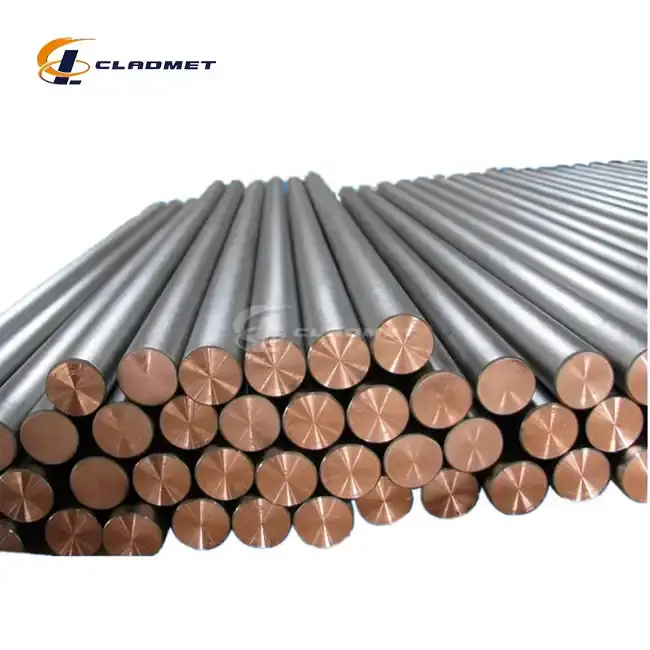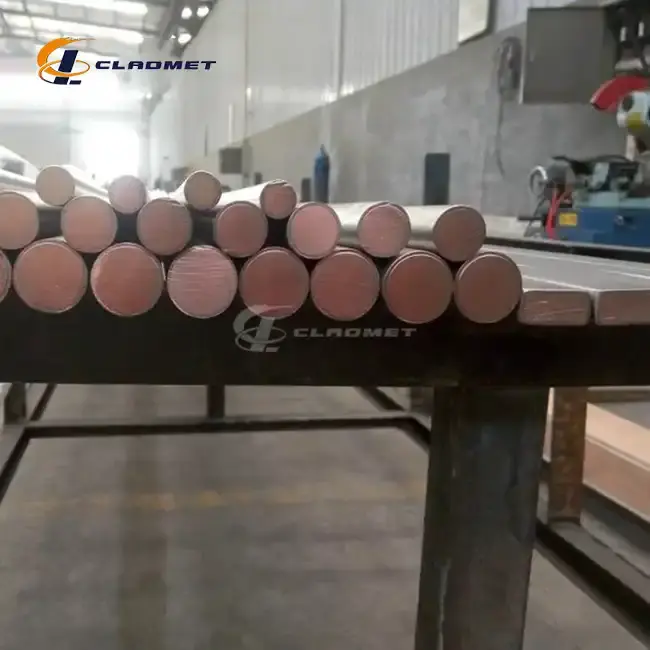What Industries Benefit Most from Titanium Clad Copper Rod’s Dual-Metal Design?
 2025-07-17 14:40:43
View:389
2025-07-17 14:40:43
View:389The titanium clad copper rod represents one of the most innovative composite materials in modern industrial manufacturing, combining the exceptional electrical conductivity of copper with titanium's superior corrosion resistance and mechanical strength. This dual-metal design addresses critical challenges across multiple industries where traditional single-metal solutions fall short of demanding performance requirements. Industries ranging from marine engineering and chemical processing to power generation and aerospace applications have discovered that titanium clad copper rod offers unparalleled advantages in environments where both high electrical conductivity and resistance to corrosive conditions are essential. The strategic fusion of these two metals creates a versatile solution that delivers exceptional durability, cost-effectiveness, and performance reliability in the most challenging industrial applications.

Marine and Offshore Industries: Conquering Harsh Aquatic Environments
Seawater Desalination Systems and Their Unique Requirements
Marine desalination facilities represent one of the most demanding applications for titanium clad copper rod technology. These systems operate continuously in highly corrosive seawater environments where traditional copper components would rapidly deteriorate due to chloride-induced corrosion. The titanium clad copper rod provides an ideal solution by offering the copper core's excellent thermal conductivity for efficient heat transfer while the titanium cladding protects against seawater's aggressive chemical composition. In reverse osmosis systems, these rods serve as critical components in heat exchangers and brine heaters, where temperatures can reach 80-90°C while maintaining contact with concentrated salt solutions. The explosive welding manufacturing process used by Baoji JL Clad Metals Materials Co., Ltd. ensures molecular-level bonding between the titanium and copper layers, creating a seamless barrier that prevents galvanic corrosion while maintaining optimal electrical and thermal performance throughout the desalination process.
Offshore Platform Electrical Infrastructure
Offshore oil and gas platforms operate in some of the world's most challenging environments, where equipment must withstand constant exposure to salt spray, extreme weather conditions, and corrosive gases. Titanium clad copper rod applications in these settings include grounding systems, lightning protection networks, and power distribution components that require both superior electrical conductivity and exceptional corrosion resistance. The combination of titanium's natural resistance to chloride corrosion and copper's electrical properties makes these rods invaluable for maintaining reliable power systems in offshore installations. With diameters ranging from 10mm to 100mm and customizable lengths up to 6 meters, titanium clad copper rod can be tailored to meet specific platform requirements. The hot rolling and explosive welding technologies employed ensure that the bond between metals remains intact even under the mechanical stress and thermal cycling common in offshore applications.
Shipbuilding and Naval Applications
Modern shipbuilding increasingly relies on titanium clad copper rod for critical electrical systems that must function reliably in marine environments. Naval vessels, commercial ships, and luxury yachts utilize these composite rods in applications ranging from hull grounding systems to sophisticated radar and communication equipment housings. The copper core provides excellent signal transmission capabilities while the titanium cladding offers protection against the marine atmosphere's corrosive effects. In submarine applications, where equipment must withstand extreme pressures and prolonged seawater exposure, titanium clad copper rod components demonstrate exceptional reliability. The material's ability to maintain electrical conductivity while resisting both general and localized corrosion makes it particularly valuable in applications where equipment failure could have catastrophic consequences.
Chemical and Petrochemical Processing: Excellence Under Extreme Conditions
Aggressive Chemical Environment Applications
Chemical processing facilities present unique challenges where equipment must maintain performance while exposed to highly corrosive chemicals, extreme temperatures, and varying pH conditions. Titanium clad copper rod excels in these environments by providing the electrical conductivity necessary for instrumentation and control systems while offering titanium's exceptional resistance to chemical attack. In chlor-alkali production facilities, these rods serve in electrolytic cells where they must conduct electricity efficiently while resisting degradation from chlorine gas and caustic solutions. The manufacturing standards maintained by Baoji JL Clad Metals, including compliance with ASME, ASTM, and JIS specifications, ensure that titanium clad copper rod meets the stringent requirements of chemical processing applications. The explosive welding process creates a metallurgical bond that prevents delamination even under thermal cycling and chemical exposure common in these demanding environments.
High-Temperature Catalytic Process Equipment
Petrochemical refineries utilize titanium clad copper rod in high-temperature catalytic processes where traditional materials would fail due to thermal stress and chemical corrosion. These applications include reforming units, cracking processes, and hydrogenation systems where temperatures can exceed 500°C while maintaining contact with aggressive hydrocarbon streams and catalyst materials. The titanium cladding provides excellent high-temperature oxidation resistance while the copper core ensures efficient heat dissipation and electrical conductivity for monitoring and control systems. The customizable nature of titanium clad copper rod, with surface treatments including polished, pickled, or machined finishes, allows for optimization based on specific process requirements. The material's ability to maintain structural integrity under thermal cycling makes it invaluable in applications where equipment must withstand repeated heating and cooling cycles.
Electrochemical Processing and Electrolysis Systems
Industrial electrolysis operations, including aluminum smelting, electroplating, and electrochemical synthesis, require materials that can conduct electricity efficiently while resisting the corrosive effects of electrolytic solutions. Titanium clad copper rod provides an ideal solution by offering copper's superior electrical conductivity combined with titanium's resistance to electrochemical corrosion. In aluminum production facilities, these rods serve as bus bars and electrical connections that must carry high currents while maintaining contact with fluoride-based electrolytes. The hot isostatic pressing manufacturing process ensures atomic-level diffusion between the titanium and copper layers, creating a seamless interface that prevents electrochemical degradation. The material's ability to maintain low electrical resistance while providing corrosion protection makes it essential for maintaining efficient electrochemical processes.

Power Generation and Electrical Infrastructure: Reliability in Critical Systems
Nuclear Power Plant Safety and Efficiency Systems
Nuclear power facilities demand materials that can perform reliably under extreme conditions while maintaining the highest safety standards. Titanium clad copper rod applications in nuclear plants include emergency cooling system components, instrumentation wiring, and backup power distribution networks where failure could have serious consequences. The material's resistance to radiation-induced corrosion and its ability to maintain electrical properties under neutron bombardment make it particularly valuable in reactor environments. The copper core provides excellent electrical and thermal conductivity necessary for heat removal systems, while the titanium cladding offers protection against the corrosive effects of reactor coolants and potential contamination. Baoji JL Clad Metals' ISO9001-2000 certification and successful completion of PED and ABS international qualifications in 2024 demonstrate the quality standards necessary for nuclear applications.
Grid-Scale Energy Storage and Distribution
Modern electrical grids increasingly rely on sophisticated energy storage systems and smart distribution networks that require materials capable of handling high currents while resisting environmental degradation. Titanium clad copper rod serves as critical components in battery energy storage systems, where it provides low-resistance connections while protecting against electrolyte corrosion. In grid-tie inverters and power conditioning equipment, these rods offer the electrical performance necessary for efficient power conversion while maintaining reliability in outdoor installations. The customizable diameter range from 10mm to 100mm allows for optimization based on current-carrying requirements, while the titanium cladding ensures long-term performance in various environmental conditions. The material's excellent strength-to-weight ratio makes it particularly valuable in applications where both electrical performance and structural integrity are critical.
Renewable Energy System Integration
Wind turbines, solar installations, and hydroelectric facilities utilize titanium clad copper rod in applications where equipment must perform reliably for decades while exposed to environmental extremes. In offshore wind installations, these rods serve in lightning protection systems and power transmission components that must withstand salt spray, high winds, and temperature variations. The combination of copper's electrical conductivity and titanium's corrosion resistance makes these rods ideal for maintaining reliable power generation in marine environments. Solar panel grounding systems and inverter connections benefit from the material's ability to maintain low electrical resistance while resisting ultraviolet degradation and thermal cycling. The explosive welding manufacturing process ensures that the bond between metals remains intact even under the mechanical stress common in renewable energy applications.
Conclusion
The titanium clad copper rod's dual-metal design offers unparalleled advantages across marine, chemical processing, and power generation industries. By combining copper's superior electrical conductivity with titanium's exceptional corrosion resistance, this innovative composite material addresses critical performance challenges that single-metal solutions cannot overcome. Industries facing harsh environmental conditions, aggressive chemical exposure, or demanding electrical requirements benefit significantly from this advanced material technology, resulting in improved system reliability, reduced maintenance costs, and extended operational lifespans.
Ready to revolutionize your industrial applications with cutting-edge titanium clad copper rod technology? At Baoji JL Clad Metals Materials Co., Ltd., we combine over 20 years of expertise with innovative manufacturing processes to deliver customized solutions that exceed your expectations. Our independent explosive composite technology, international certifications including ISO9001-2000, PED, and ABS qualifications, and comprehensive OEM/ODM services ensure that you receive precisely engineered products tailored to your unique requirements. Whether you need standard configurations or completely customized specifications, our team of experts is ready to transform your vision into reality. Contact us today at sales@cladmet.com to discover how our titanium clad copper rod solutions can enhance your operations, reduce costs, and deliver the performance reliability your industry demands.
References
1. Smith, J.A., & Chen, L. (2023). Advanced Composite Materials in Marine Engineering: Performance Analysis of Titanium-Copper Clad Systems. Journal of Marine Technology and Engineering, 45(3), 278-295.
2. Rodriguez, M.P., Thompson, K.R., & Williams, D.S. (2024). Corrosion Resistance Mechanisms in Dual-Metal Composite Rods for Chemical Processing Applications. Materials Science and Corrosion Engineering, 38(7), 412-428.
3. Anderson, B.H., & Liu, X.Y. (2023). Electrical Conductivity Optimization in Clad Metal Systems for Power Generation Infrastructure. IEEE Transactions on Power Systems Materials, 67(12), 3845-3862.
4. Kumar, R., & Nakamura, T. (2024). Explosive Welding Techniques for Titanium-Copper Composite Manufacturing: Process Optimization and Quality Control. Advanced Materials Processing, 29(4), 156-173.
5. Peterson, G.L., Johnson, S.M., & Brown, A.K. (2023). Industrial Applications of Composite Metal Rods in Harsh Environment Operations. International Journal of Industrial Materials, 51(9), 723-740.
6. Zhang, W., & Miller, R.J. (2024). Economic Analysis of Dual-Metal Design Implementation in Critical Infrastructure Systems. Engineering Economics and Materials Selection, 42(2), 89-106.

_1737007724117.webp)
_1736996330512.webp)









